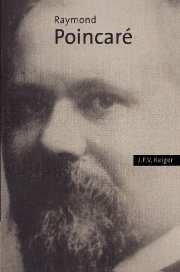Book contents
- Frontmatter
- Contents
- Acknowledgements
- Introduction
- 1 The private man
- 2 Poincaré the politician
- 3 Poincaré the Opportunist
- 4 Poincaré en réserve de la République
- 5 Poincaré the diplomat
- 6 Poincaré President of the Republic
- 7 Poincaré-la-guerre
- 8 Poincaré-la-paix
- 9 Poincaré-la-Ruhr
- 10 Poincaré-le-franc
- Conclusion: Poincaré remembered
- Notes
- Select bibliography
- Index
2 - Poincaré the politician
Published online by Cambridge University Press: 06 July 2010
- Frontmatter
- Contents
- Acknowledgements
- Introduction
- 1 The private man
- 2 Poincaré the politician
- 3 Poincaré the Opportunist
- 4 Poincaré en réserve de la République
- 5 Poincaré the diplomat
- 6 Poincaré President of the Republic
- 7 Poincaré-la-guerre
- 8 Poincaré-la-paix
- 9 Poincaré-la-Ruhr
- 10 Poincaré-le-franc
- Conclusion: Poincaré remembered
- Notes
- Select bibliography
- Index
Summary
Poincaré was not a natural politician. He had shown no enthusiasm for the subject other than as a fertile source of academic debate like any other during his student days. He was probably, in those early years of the embryonic Third Republic, ill-suited to politics. The 1870s were passionate years when politicians of the Right and Left held deeply conflicting opinions about the political course France should set. By upbringing and temperament Poincaré was the opposite of passionate and doctrinaire. Young, liberal, tolerant and cautious, he was far more in tune with the settled and relatively well-established Third Republic of the 1880s. What the regime appeared to need in its second decade was not so much idealists as realists, not so much innovators as administrators, more managers than politicians per se. Republican lawyers fitted the bill perfectly. They wished to build democracy into a framework of precise legal texts based on the great tenets of 1789: individual freedom, civil equality and national sovereignty. The great Republican laws on the press, education and religious associations would be expressions of this. Almost effortlessly Poincaré could glide into the political establishment and along with the political trends of the first half of the Third Republic which marked France's apprenticeship of political democracy. He even fitted the statistical profile of the early Third Republican government member in coming from the north-east of France, which, contrary to received opinion, was the chief purveyor of ministers and not the south-west, whose day would come under the so-called ‘Radical Republic’.
- Type
- Chapter
- Information
- Raymond Poincaré , pp. 33 - 72Publisher: Cambridge University PressPrint publication year: 1997

